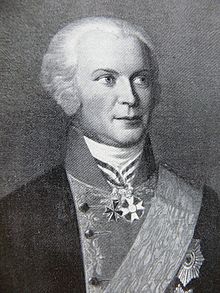Ernst von Rüchel
Ernst von Rüchel | |
|---|---|
 Ernst von Rüchel | |
| Born | 21 July 1754 Ziezeneff, Pomerania |
| Died | 14 January 1823 (aged 68) Haseleu, Pomerania |
| Allegiance | |
| Service/ | Infantry |
| Rank | General of the Infantry |
| Battles/wars | French Revolutionary Wars Napoleonic Wars |
| Other work | Chief, Infantry Regiment Nr. 2, 1805 |
Ernst von Rüchel (21 July 1754 – 14 January 1823) was a
Early career
Rüchel was born on 21 July 1754 in Ziezeneff in Prussian
With the rank of
On 23 May 1794, Rüchel led a column in a Prussian victory at the Battle of Kaiserslautern. On this occasion he led three battalions each of the Infantry Regiments Rüchel Nr. 30 and Wolframsdorf, the Ernst Fusilier Battalion Nr. 19, three foot jäger companies, three squadrons each of the Eben Hussar Regiment Nr. 2 and Voss Dragoon Regiment Nr. 11, two foot artillery batteries, and one horse artillery battery.[3] At the Peace of Basel in 1795, Prussian abandoned the First Coalition to concentrate her energies on the Third Partition of Poland.[4]
1806 and later
In 1806 Rüchel was the commander-in-chief of the Infantry Regiment Nr. 2.

Emperor
Historian David G. Chandler argued that Rüchel was unfairly criticized for his belated appearance. He received news of the battle at 9:00 AM and left his camp at Weimar immediately. His troops marched five kilometers in one hour, then they deployed from march columns into platoon columns with flank guards out and the artillery at the ready. At 10:30 AM, he got a misleading note from Hohenlohe saying that the battle was going well. Around noon Hohenlohe sent him another message asking for immediate assistance. Just before his troops reached Kapellendorf around 1:00 PM, a courier brought news that the Prussian army was defeated. It took Rüchel a total of four hours to move 12 kilometers, including the time it took to break camp; this was not a slow pace by Prussian standards.[13] He brought 15,000 troops and 40 field pieces to the battlefield. Altogether, there were 25 squadrons from five cavalry regiments, three foot jäger companies, 14 musketeer battalions from seven infantry regiments, four fusilier battalions, two grenadier battalions, three foot batteries, and two horse batteries.[14]
Wounded, Rüchel narrowly avoided capture during the next few weeks.[15] During the maneuvers that ended in the Battle of Eylau on 7 and 8 February 1807, Rüchel commanded the 4,000-strong Prussian garrison of Königsberg. At that time, Anton Wilhelm von L'Estocq led the 9,000-man Prussian field force.[16]
Rüchel died on 14 January 1823 in Haseleu, Pomerania.
Notes
- ISBN 1-85367-276-9.
- ^ Smith (1998), p. 66
- ^ Smith (1998), p. 81
- ISBN 1-56731-022-2.
- ISBN 0-8008-5471-3.
- ^ Chandler, David G. (1966). The Campaigns of Napoleon. New York, N.Y.: Macmillan. p. 456.
- ^ Chandler (1966), p. 459
- ^ Chandler (1966), pp. 467-468
- ISBN 0-275-98612-8.
- ^ Chandler (2005), p. 23
- ISBN 1-85367-145-2.
- ^ Petre (1993), p. 147
- ^ a b Chandler (2005), p. 64
- ^ Chandler (2005), p. 42
- ^ Petre (1993), p. 197
- ^ Petre, F. Loraine (1976). Napoleon's Campaign in Poland 1806-1807. London: Lionel Leventhal Ltd. p. 131.
References
- ISBN 0-275-98612-8.
- Chandler, David G. (1966). The Campaigns of Napoleon. New York, N.Y.: Macmillan.
- ISBN 1-56731-022-2.
- ISBN 1-85367-145-2.
- Petre, F. Loraine (1976). Napoleon's Campaign in Poland 1806-1807. London: Lionel Leventhal Ltd.
- ISBN 0-8008-5471-3.
- ISBN 1-85367-276-9.
